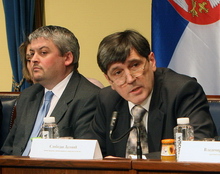Q:
A:
Social services for underprivileged to be improved
Belgrade,
5 April 2007
Serbian Minister of Labour, Employment and Social Policy Slobodan Lalovic and presidents of 24 municipalities signed today a memorandum on cooperation in the project “Supporting Implementation of the Social Welfare System Reform Strategy” in the press room of the Serbian government building.
Lalovic said after the signing of the memorandum that before obtaining funds from international donations, municipalities will have to work out social policy development plans.
The Minister recalled that so far that state has spent €120 million on the reform of social care and underlined that in the past four years the number of absolutely poor citizens has been reduced by 300,000.
He said that local communities in Serbia will significantly improve social care services for the underprivileged in the upcoming years, adding that 80 more municipalities will be included in the project by the end of the year.
This project is worth €5.1 million and has been supported by the British Department for International Development (DFID) in Serbia with €3.5 million and the Norwegian Ministry of Foreign Affairs with €1.6 million.
Head of DFID for Serbia George McLaughlin said that Great Britain has been supporting the development of social care in Serbia for seven years already and that significant progress has been made. The project will include 15 pilot areas chosen at the open competition for the project “Supporting Implementation of the Social Welfare System Reform Strategy”, which is being realised with the support of the DFID and the Norwegian Ministry of Foreign Affairs.
The all inclusive aim of the project is supporting capacity building in the Ministry of Labour, Employment and Social Welfare, local self-governments and all other relevant participants in the social welfare system at central and local levels, so that they could contribute to the implementation of the Social Welfare System Reform Strategy and secure timely and successful decentralisation within the social welfare system.
Out of 15 selected pilot areas, 12 are individual applications of municipalities (Bor, Kikinda, Valjevo, Loznica, Cacak, Knjazevac, Kanjiza, Krusevac, Zrenjanin, Subotica, Stara Pazova and Ivanjica).
The remaining three areas are examples of inter-municipal cooperation, as a crucial mechanism of the decentralisation process (1. Jagodina, Paracin, Cuprija, Svilajnac, Despotovac, Rekovac; 2. Vrsac, Plandiste, Bela Crkva, Alibunar; 3. Zajecar and Soko Banja).
Selected municipalities are those where local-self-governments have shown willingness to make major efforts in the areas of social policy and the monitoring of the needs of most sensitive groups which use social welfare services.
In that context this project will contribute to securing innovative and viable decentralisation of social welfare services. Municipalities will be provided individual mentor support, as well as individual and collective training in the area of strategic planning connected with social policy.
Besides that, additional financing will be provided from funds worth €1.5 million as support to the regular allocations from the budget for municipalities for offering new social services to the community.
The development of new services will be directed to satisfying needs of socially disadvantaged groups in pilot areas. Support will also be given in monitoring and assessing the realisation and effects of these services.
The Minister recalled that so far that state has spent €120 million on the reform of social care and underlined that in the past four years the number of absolutely poor citizens has been reduced by 300,000.
He said that local communities in Serbia will significantly improve social care services for the underprivileged in the upcoming years, adding that 80 more municipalities will be included in the project by the end of the year.
This project is worth €5.1 million and has been supported by the British Department for International Development (DFID) in Serbia with €3.5 million and the Norwegian Ministry of Foreign Affairs with €1.6 million.
Head of DFID for Serbia George McLaughlin said that Great Britain has been supporting the development of social care in Serbia for seven years already and that significant progress has been made. The project will include 15 pilot areas chosen at the open competition for the project “Supporting Implementation of the Social Welfare System Reform Strategy”, which is being realised with the support of the DFID and the Norwegian Ministry of Foreign Affairs.
The all inclusive aim of the project is supporting capacity building in the Ministry of Labour, Employment and Social Welfare, local self-governments and all other relevant participants in the social welfare system at central and local levels, so that they could contribute to the implementation of the Social Welfare System Reform Strategy and secure timely and successful decentralisation within the social welfare system.
Out of 15 selected pilot areas, 12 are individual applications of municipalities (Bor, Kikinda, Valjevo, Loznica, Cacak, Knjazevac, Kanjiza, Krusevac, Zrenjanin, Subotica, Stara Pazova and Ivanjica).
The remaining three areas are examples of inter-municipal cooperation, as a crucial mechanism of the decentralisation process (1. Jagodina, Paracin, Cuprija, Svilajnac, Despotovac, Rekovac; 2. Vrsac, Plandiste, Bela Crkva, Alibunar; 3. Zajecar and Soko Banja).
Selected municipalities are those where local-self-governments have shown willingness to make major efforts in the areas of social policy and the monitoring of the needs of most sensitive groups which use social welfare services.
In that context this project will contribute to securing innovative and viable decentralisation of social welfare services. Municipalities will be provided individual mentor support, as well as individual and collective training in the area of strategic planning connected with social policy.
Besides that, additional financing will be provided from funds worth €1.5 million as support to the regular allocations from the budget for municipalities for offering new social services to the community.
The development of new services will be directed to satisfying needs of socially disadvantaged groups in pilot areas. Support will also be given in monitoring and assessing the realisation and effects of these services.











